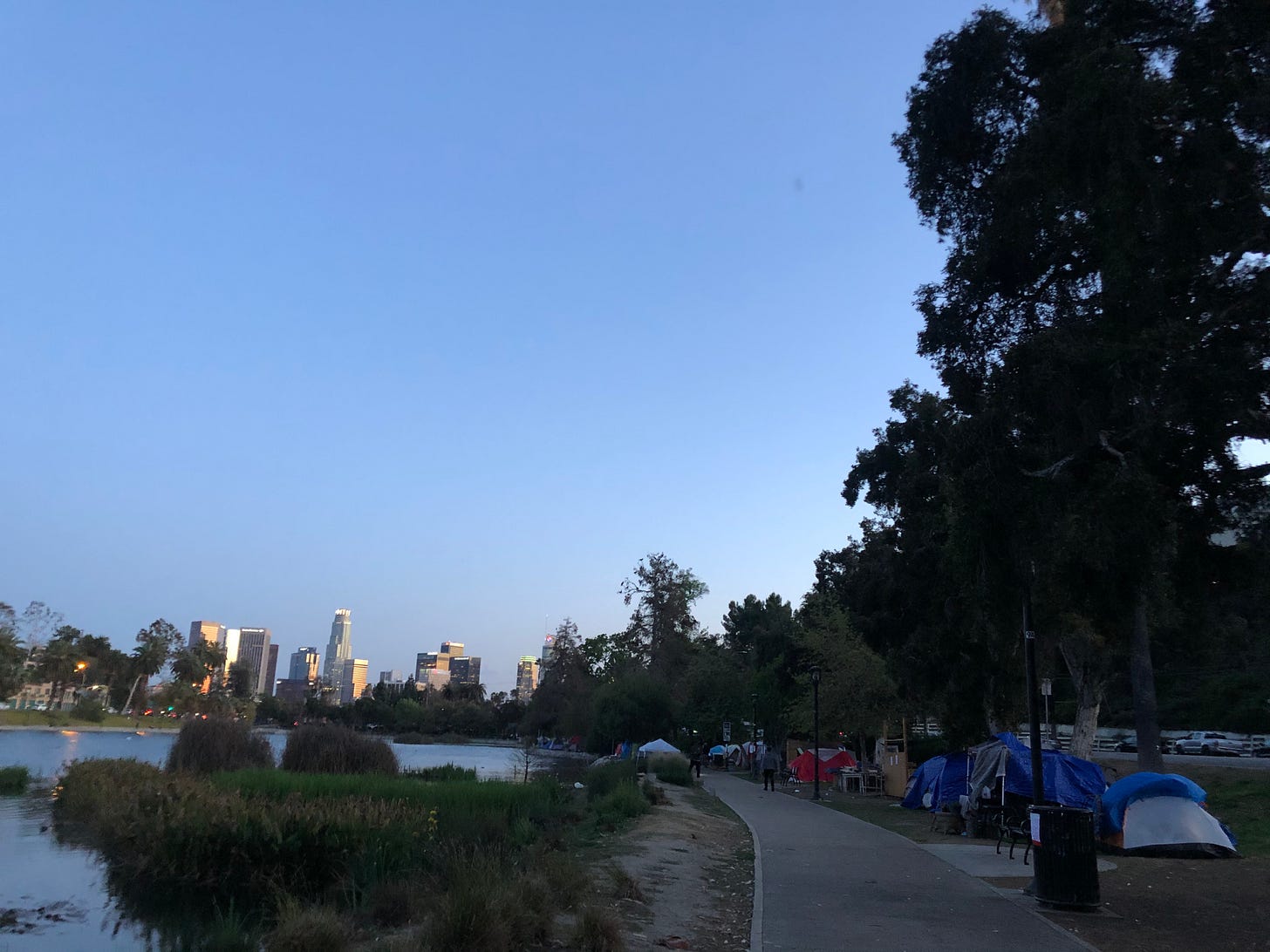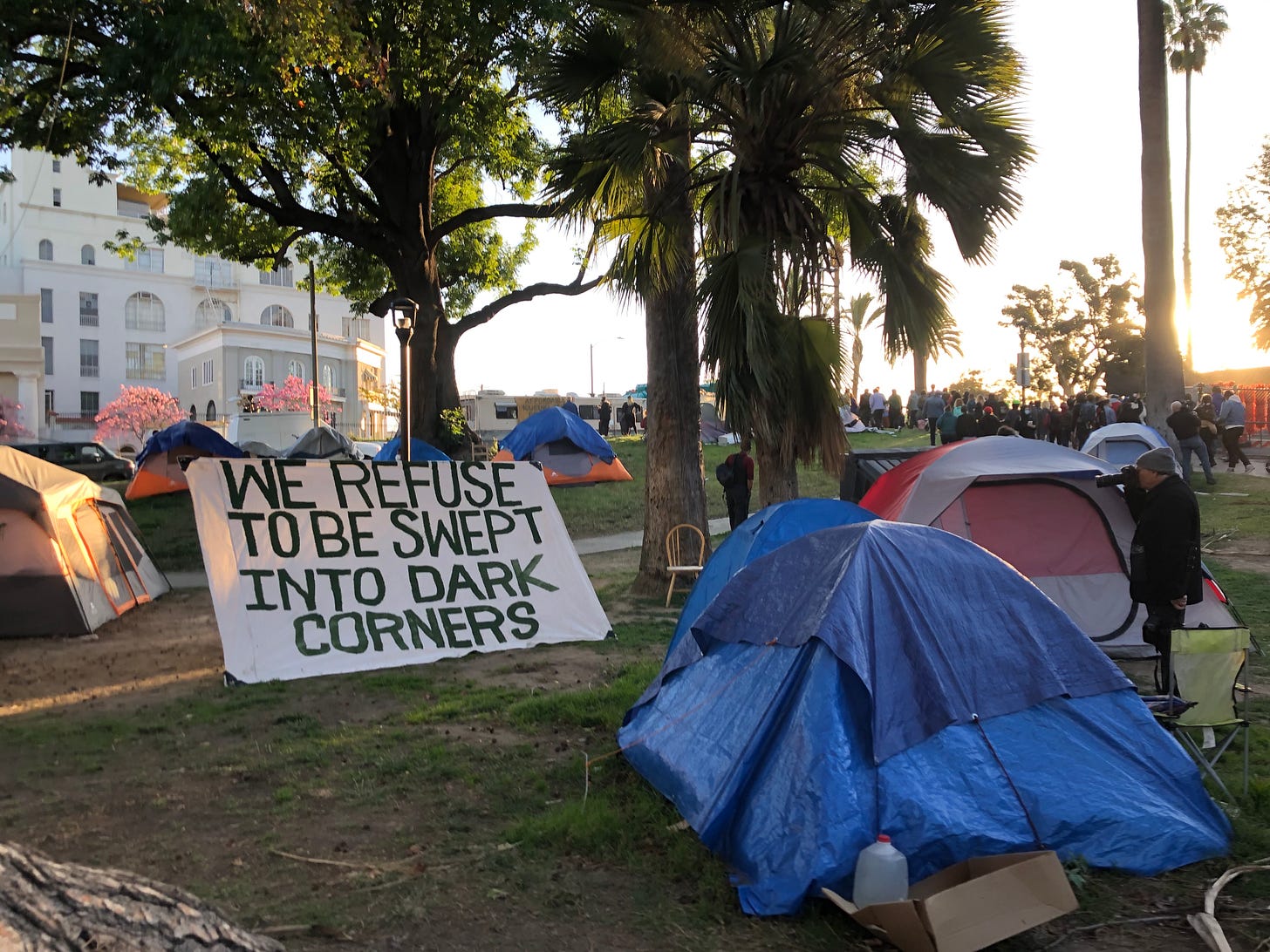
I first met Susan Samuelson, age 65, at Echo Park Lake the day before it was surrounded by Los Angeles police and fenced off. She lived in a ramshackle shelter under a shady tree built up near the southern end of the park.
Samuelson said she’s been homeless for about 12-years. She was born in L.A. County, and said she moved to the park this past year from a nearby spot under the Hollywood Freeway. In her years without secure housing, she has walked countless miles of L.A.’s streets, sidewalks, and alleyways. She strung together a meager living of exchanging gleaned recyclables for change.
“And I didn't have much to go on. I just recycled, but Lord made a way for me to have it,” she said. “I had a few kitties, and my doggy, and I was happy.”
But now, she’s slowing down. When the pandemic hit, she heard others were living at Echo Park Lake with some stability and support. Having lived most of her life in the same area, Samuelson has fond childhood memories of visiting the park with her father in the 1960s. Matched with her deep love of the city fauna with whom she shares outdoor space, those memories helped make the decision to move to the park a no-brainer.
At the park, she even had some help. Nice people brought her food and water every day, and made sure she had clothes, blankets, and tarps to keep warm and dry. But most importantly, she could continue living close alongside her animal friends.
“Geese, coyotes, raccoons, possums, cats, squirrels! The horses used to have a trail up there too,” she said, pointing up towards a pathway just above Glendale Boulevard. “I wouldn't want to leave here just in case maybe the animals might be wiped out. A lot of things need to be cared for that haven't been cared for.”
Two days later, Samuelson was one of the last people to leave Echo Park Lake. She was escorted out of the park’s gate on Thursday with two packed suitcases, and a stroller piled high with some of her other belongings. The police looked on as she accosted the scrum of people leading her out of the park.
"I've been perfectly happy and healthy here, and now you're telling me to go away while treating me like an invalid and a fool,” she shouted. "Believe it or not, you're going to miss me. You're so determined to get me out of there, but you're going to miss me."
She was met by her adult son, Wyatt, who had called out from work to come find her. He visited her weekly at the park, and was scared when he saw videos of the park’s closure on the news and social media. He says he’s not in a position to take her in and house her himself. But when I met him that day, he said he planned to rent his mother a hotel room nearby for a few days, and take her and her belongings to it.
When Susan got close enough to recognize me from the previous few days, she led with a question, and pointed to the line of police guarding the fenced off park.
“Haven’t we gone further than this?”
The answer to Susan’s question is that we have not gone further than this.
Many hail the break-up of the Echo Park Lake encampment as a reclamation of public space, and an encouraging sign of progress. As many others consider it a haunting vision of a near future where police led encampment sweeps of an ever-growing unsheltered population escalate at an alarming scale.
It’s an ugly schism not easily bridged. And it’s widened by elected officials conducting business in secret, and going out of their way to spread lies about what is actually happening to the vulnerable, unsheltered people whose lives hang in the balance.
At the center the Echo Park Lake closure is L.A. City Councilmember Mitch O’Farrell, who represents the district where the park is situated. While rumors of the park’s closure began spreading the weekend before it happened, O’Farrell repeatedly declined to say when the park was actually going to close. This sowed mass confusion among not just activists and the park residents, but also the very social service agents O’Farrell had tasked with moving people from the park into shelter.
Instead of softening his tone after the closure, O’Farrell doubled down on his position. In his weekend newsletter, he said “outside groups” protesting the park’s closure were attempting to “thwart our work” towards sheltering those remaining at the park. This is a complete untruth as 1) those “outside groups” were actually self-organized homeless people living at Echo Park Lake who 2) were doing the work of convincing others at the park to leave or accept a hotel room right until they were taken into police custody after everybody else had left.
All of this is to say that an already tense situation was made worse by the petty lies of enormously influential politicians. But obscured by the spun-up narratives readymade for the evening news broadcast are real people.
Key to the official narrative is the claim that everyone living at Echo Park Lake was offered some sort of alternative housing or shelter option before they were asked to leave. It’s a requirement rooted in the 9th U.S. Circuit Court of Appeals’ standing in the Martin V. Boise case. In so many words, the court holds that a jurisdiction must provide an offer of shelter to an unhoused person before arresting or ticketing them for camping (or other a myriad of other activities) in public.
But the court’s standing, as I’ve pointed out before, is light on the important details that define what kind of shelter is appropriate, and precisely who and how and when it is supposed to be offered before an anti-camping law can be enforced against an unhoused person. (L.A. City Attorney Mike Feuer advised O’Farrell on the issue, but wouldn’t say what the advice was, according to the L.A. Times.)
Those questions, what kind of shelter, and when and how and by who it is offered, are key to understanding and evaluating what sort of achievement was made by the occupation and closure of Echo Park Lake.
As of Tuesday morning, more than four days after the park closed, there still isn’t a single agreed-upon set of results that says how many people went to what kind of shelter. A spokesperson for LAHSA said Monday that the “overwhelming majority” of the 184 people he knew to be placed went into temporary Project Roomkey hotel rooms, but that he couldn’t provide an “exact breakdown as folks are moving around.”
Councilmember O’Farrell’s office responded Monday only to say that they were going to check with LAHSA. Four days prior O’Farrell’s office issued a statement that said: “Almost 200 of the park’s unhoused population has accepted and been placed in shelter options through Project Roomkey, Project Homekey, A Bridge Home and winter shelter.”
With the exception of Homekey rooms, which are permanent, all of the shelter options are temporary.
For her part, Susan Samuelson is not a part of the 184 to 209 people to be sheltered in connection to the closing of Echo Park Lake. Though she was offered a spot in a hotel room, she declined the offer because of past experiences with homeless service agencies and their staff that have left her feeling betrayed. She looks at most offers of help with suspicion.
“They just want to extort money from you. They want to lessen the value of you or others anybody that's had any kind of trials,” Samuelson said. “Don't label people with a fucking label.”
There’s a lot to be said of those in Samuelson’s position. Where at one point they may have sought help and been prepared to accept it, repeated failures have left them so jaded to the potential of anything other than a life outside. But the reality is, Samuelson is entirely the sort of person LA’s homeless service system should be able to help before her health worsens any further.
Samuelson is a portrait of vulnerability. When I first met her, she had smeared a white plaster-like substance on her skin because, she said, it was good for her pores. While she is able to walk, she complains of chronic pain. Her son confirms that she has endured a myriad of devestating physical trauma during the years she’s been outside.
And yet, she remains outside, seemingly estranged from resources supposedly designed to help people just like her.
Susan’s son Wyatt told me that he was relieved when she first moved to the park a few months ago. While the park was still a desperate community of last resort, he thought it was a vastly safer option than the bridge she had been under before. He knew the park’s community could provide for her. When the lake closed, her son was prepared to rent a hotel room for her. But each hotel they visited either said it was full, or wouldn’t let Wyatt pay in advance for a several day stay.
So, at the end of Thursday, Samuelson told her son to just drop her off right at one of the spots she lived at before she went to Echo Park Lake. Now, instead of being under a shady tree by the lake, Susan is under another bridge on a busy street a few blocks away.
It’s certainly a predictable outcome, and one that was repeated for dozens of others who fled into the surrounding neighborhood as the park was surrounded by police. That dozens of people were displaced from the park without housing or shelter is ignored by the power brokers who forced into action a plan that walled off Echo Park Lake under the cover of darkness and a military style police occupation.
On the night the fence went up, I actually ran into Susan as she frantically packed her belongings. While she was dismayed that she was losing what was likely her most stable living situation in years, she was surprised at the massive showing of people.
“I can’t believe that all of this is because of me.”
Officials and activists who pushed for the park encampment to be broken up employed the rhetoric of “safety” to plead their case. They claimed that the park was a violent and unsafe environment. Councilmember O’Farrell repeatedly pointed to the multiple deaths that occurred in the park over the last year.
There are elements of truth in the claim the park was unsafe. Marginality breeds desperation, and even a self-organized community supported by housed residents with means can’t erase the daily truma of unsheltered life in Los Angeles. The day I spent at the park before it was broken up, I saw a woman being beaten by a much larger man. A few hours later, another woman threatened a young man with a golf club as she accused him of burglarizing her belongings.
These things are routine in life outside. People are beat, possessions stolen, and the trauma suppressed because survival is only complicated for those who dwell. But if anything, Echo Park Lake’s robust support network lessened the blows of survival most days. It certainly was no less safe than any other tent encampment on the margins in L.A. In any case, it certainly wasn’t the park’s well-to-do visitors who have homes and apartments of their own who were remotely unsafe.
But now, after being forcibly displaced, Susan Samuelson is definitively more isolated and less safe. After 12-years outside, it’s back to fending for herself on the streets of Echo Park.






